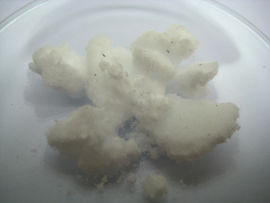Difference between revisions of "Potassium bisulfate"
Diachrynic (Talk | contribs) |
|||
| (3 intermediate revisions by one other user not shown) | |||
| Line 7: | Line 7: | ||
| OtherNames = Potassium acid sulfate<br>Sal enixum | | OtherNames = Potassium acid sulfate<br>Sal enixum | ||
<!-- Images --> | <!-- Images --> | ||
| − | | ImageFile = | + | | ImageFile = Potassium_bisulfate.jpg |
| − | | ImageSize = | + | | ImageSize = 270 |
| ImageAlt = | | ImageAlt = | ||
| ImageName = | | ImageName = | ||
| + | | ImageCaption = Crude potassium bisulfate leftover from nitric acid synthesis | ||
| ImageFile1 = | | ImageFile1 = | ||
| ImageSize1 = | | ImageSize1 = | ||
| Line 137: | Line 138: | ||
The bisulfate is then recrystallized from the solution. | The bisulfate is then recrystallized from the solution. | ||
| + | |||
| + | Potassium bisulfate is a side product in [[Glauber's nitric acid synthesis]]. Dissolving the solid waste and recrystallizing it from water will give a relative pure potassium bisulfate. | ||
==Projects== | ==Projects== | ||
| Line 156: | Line 159: | ||
===Relevant Sciencemadness threads=== | ===Relevant Sciencemadness threads=== | ||
*[http://www.sciencemadness.org/talk/viewthread.php?tid=67479 Potassium Hydrogen Sulfate Preparation - KHSO4] | *[http://www.sciencemadness.org/talk/viewthread.php?tid=67479 Potassium Hydrogen Sulfate Preparation - KHSO4] | ||
| + | *[http://www.sciencemadness.org/talk/viewthread.php?tid=69543 Potassium bisulfate] | ||
| + | *[http://www.sciencemadness.org/talk/viewthread.php?tid=67880 potassium bisulfate + Hydrogen peroxide] | ||
[[Category:Chemical compounds]] | [[Category:Chemical compounds]] | ||
Latest revision as of 10:50, 27 October 2019
 Crude potassium bisulfate leftover from nitric acid synthesis
| |
| Names | |
|---|---|
| IUPAC name
Potassium hydrogen sulfate
| |
| Other names
Potassium acid sulfate
Sal enixum | |
| Properties | |
| KHSO4 | |
| Molar mass | 136.169 g/mol |
| Appearance | White solid |
| Odor | Odorless |
| Density | 2.245 g/cm3 |
| Melting point | 197 °C (387 °F; 470 K) |
| Boiling point | 300 °C (572 °F; 573 K) (decomposes) |
| 36.6 g/100 mL (0 °C) 49 g/100 mL (20 °C) 121.6 g/100 mL (100 °C) | |
| Solubility | Soluble in acetone, ethanol |
| Thermochemistry | |
| Std enthalpy of
formation (ΔfH |
-1163.3 kJ/mol |
| Hazards | |
| Safety data sheet | FischerScientific |
| Lethal dose or concentration (LD, LC): | |
| LD50 (Median dose)
|
2340 mg/kg |
| Related compounds | |
| Related compounds
|
Sodium bisulfate |
| Except where otherwise noted, data are given for materials in their standard state (at 25 °C [77 °F], 100 kPa). | |
| Infobox references | |
Potassium bisulfate is an acid salt of potassium, with the formula KHSO4, made from the partial neutralization of a potassium base.
Contents
Properties
Chemical
Potassium bisulfate will decompose when heated above 250-300°C to form potassium pyrosulfate and water:
- 2 KHSO4 → K2S2O7 + H2O
Heating the potassium pyrosulfate above 600°C will give off sulfur trioxide and leave behind potassium sulfate. Strong heating of the potassium bisulfate will above this temperature will achieve the same result:
- K2S2O7 → K2SO4 + SO3
- 2 KHSO4 → K2SO4 + SO3 + H2O
Physical
Potassium bisulfate is a white solid, soluble in water. It has a density of 2.245 g/cm3.
Availability
Unlike its sodium counterpart, potassium bisulfate does not appear to be available as pH lowering chemical for swimming pools.
Addition of Oxone to water will yield potassium bisulfate and hydrogen peroxide. Potassium sulfate will also be a secondary product.
It can best be purchased from eBay and Amazon.
Preparation
Potassium hydrogen sulfate can be made by reacting two solutions containing equimolar amounts of potassium hydroxide and sulfuric acid:
- KOH + H2SO4 → KHSO4 + H2O
The bisulfate is then recrystallized from the solution.
Potassium bisulfate is a side product in Glauber's nitric acid synthesis. Dissolving the solid waste and recrystallizing it from water will give a relative pure potassium bisulfate.
Projects
- Make potassium persulfate
- Make potassium pyrosulfate
Handling
Safety
Contact with potassium bisulfate will irritate the skin, eyes and mucous tissues. Despite being a salt rather than a fully saturated acid, potassium bisulfate solutions have a much lower pH than many acids themselves, and should be treated with care. It may also release sulfuric acid fumes upon storage.
Storage
In closed plastic or glass containers.
Disposal
Can be neutralized with any base.